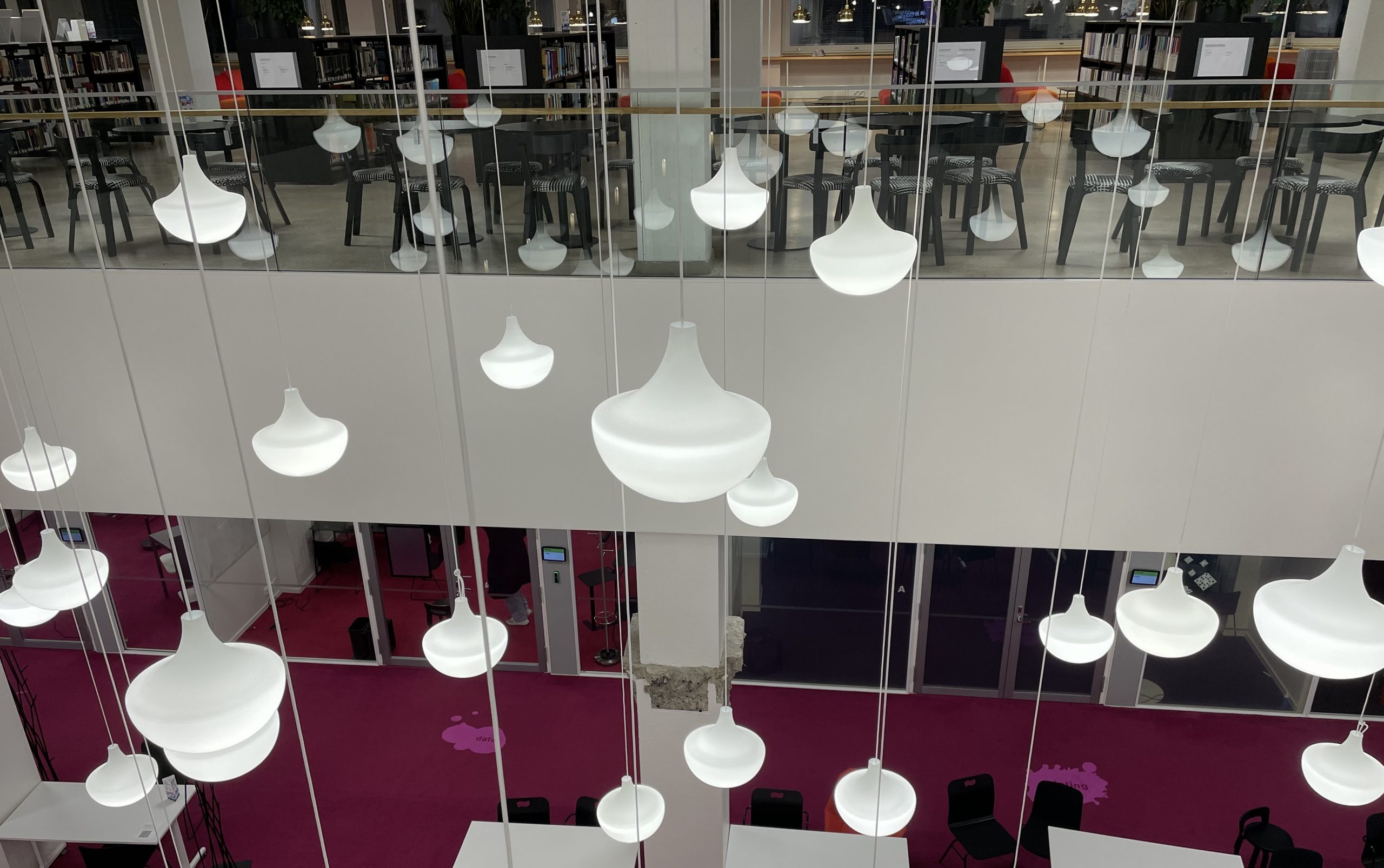
A blog post published ten years ago presented Aalto University’s new Learning Centre service concept, and in an interview, Matti Raatikainen discussed the organisational change that took effect at Aalto in 2018. Both emphasized focusing on customers and their needs.
The Otaniemi campus has changed a lot in ten years and new, different learning spaces have emerged around the entire campus, but the Learning Centre, the heart of the campus, has remained popular among students. The service concept of the Harald Herlin Learning Centre, reopened in 2016, has proven to be sustainable over time, even though functions have been developed or discontinued. The development work continues together with the users and spaces freed up by other functions are rebuilt in the way they wish. Lately we added various study and group work spaces as well as project rooms that serve as shared spaces for both students and staff, studying and sharing ideas.
Before the pandemic, the number of visitors to the Learning Centre was the highest in the building’s history, and we are slowly emerging from the pandemic pit. Today, the facilities are mostly used for studying, working and group work. According to the queue number data, only about 5% of the customers entering the premises come to the service desk. Based on circulation statistics, the borrowing of books has decreased by 63% over the past 10 years. However, printed material from certain collections, such as architecture, art, and design, is still widely read and browsed on the spot. Finding and using information resources is mainly done as a self-service, and as a result, customer service has become digitalized. Today, about a third of customer service contacts are made by email.
The organisational change in 2018 also meant changes in job descriptions. Some of the old tasks were abandoned and replaced with new ones. The Service Points team, which is part of the Learning Services, is responsible for customer service not only at the Learning Centre, but also at the Starting Point, the general service point for students, where questions and answers are related to study administration. Thesis-related tasks have increased and are today the second most time-consuming tasks, right after customer service.
While the Service Points team maintains the Learning Centre’s infrastructure, the Library Resources team, which is part of Research Services, takes care of the content. After the renovation, only 30% of the physical collections were moved back to the Learning Centre, and currently only 1% of our acquisition budget is spent on the purchase of printed books or journals. Working with library resources requires not only traditional library expertise, but also up-to-date legal and technical expertise in order to successfully implement changing terms of use, license agreements and technical requirements. Based on these competencies, the team provides customer service and guidance on the use of the resources, but also in finding complementary content from other libraries or open repositories. Based on usage statistics, we have not yet seen any changes in the need of licensed library resources or in the need for support and guidance in finding relevant materials.
At the time of the organisational change, open science had already created a need for a new kind of customer service, mainly aimed at researchers. The Open Science and ACRIS (OSA) team was established to maintain Aalto University’s current research information system ACRIS and to create and deliver open science services, focusing on communication, guidance and training related to open access publishing and research data management. Publication analyses and the research integrity advisory network are also part of the work of the OSA team, as is the network of data agents established in 2017 that provides support to researchers in questions related to research data at their department.
At Aalto, research services are divided into six school teams, and the members of the OSA team are closely involved in the activities at the schools. The contact persons have a comprehensive view of their schools’ research and publication activities, as they participate in the DMP evaluation process and validate all their school’s publications. Versatile publication reporting and analysis of data in ACRIS help to understand where and with whom Aalto researchers publish, with whose funds publications are opened, and what kind of services or support related to publications or data researchers need. Feedback from customers is generally very positive. Most of the questions and complaints concern APC and BPC fees, as well as the lack of an open access fund.
Dividing responsibilities into smaller parts has given both teams and individual employees a better chance of coping in a rapidly changing environment. To some extent, the opportunities of specialisation have increased work motivation and professionalism in the teams. Being part of a service organization that provides like-minded services gives the team members a better understanding of the core process their work is part of – research or learning. However, it can be difficult to operate when you have an insight in only one of these processes and the overall picture of the common characteristics of library services may be incomplete. That’s why the importance of collaboration and transparency between teams cannot be overemphasized.
As for the satisfaction of our customers, all indicators show that we continue to meet their expectations. Based on customer surveys and qualitative feedback, we can see that the customers of all three teams are satisfied with the quality of service and the changes behind the scenes have not been visible to the customers. The customer is still our focus, and we listen to them. We however need to listen to them better together and base the development of our services on our joint analysis, with the strength of three teams.
Tua Hindersson-Söderholm
service manager, library resources
Aalto University
Saija Nieminen
specialist , Learning Centre Customer Service
Aalto University
Matti Raatikainen
service manager, service points
Aalto University
Anne Sunikka
service manager, open science and ACRIS
Aalto University
